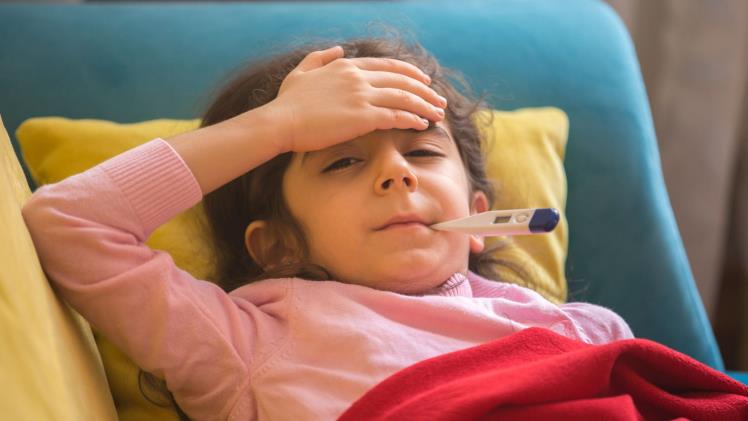Top Causes Of Fever In Children And How To Prevent Them

Fever is a common symptom in children that can cause worry among parents. It’s a natural response to infection, but understanding the underlying causes and taking preventive measures can help alleviate concerns and promote your child’s well-being.
Fever in children can be caused by various factors, including viral infections like the common cold, flu, and RSV, bacterial infections like ear infections and UTIs, and other conditions like teething and heatstroke. By taking preventive measures such as frequent handwashing, vaccination, and keeping a healthy lifestyle, you can reduce the fear of your child developing a fever.
Common Causes of Fever in Children
Fever is usually a sign that the body is fighting off an infection. Here are some of the most common causes of fever in children:
- Common Cold
One of the most frequent causes of fever, especially in young children.
- Flu
Characterized by high fever, body aches, and cough.
- Respiratory Syncytial Virus (RSV)
A common respiratory virus that can cause fever, cough, and difficulty breathing, especially in infants.
- Ear Infections
Often accompanied by ear pain and irritability.
- Urinary Tract Infections (UTIs)
Can cause fever, frequent urination, and pain during urination.
- Strep Throat
A bacterial infection that can cause fever, sore throat, and swollen lymph nodes.
- Teething
While fever is not a direct symptom of teething, it can sometimes occur due to increased saliva production or a minor infection.
- Heatstroke
Excessive heat exposure can lead to fever, dehydration, and other serious health problems.
- Immunizations
Some vaccines can cause mild fever as a side effect.
How To Prevent Fever In Children
While it’s impossible to completely prevent fever, taking specific preventive measures can significantly lessen the risk:
- Frequent Handwashing
Encourage frequent handwashing, especially before meals, after using the bathroom, and after playing outdoors.
- Vaccination
Ensure your child receives all suggested vaccinations to protect against preventable diseases.
- Healthy Diet
A balanced food rich in fruits, vegetables, and whole grains can boost the immune system.
- Adequate Sleep
Sufficient sleep helps the body rest and repair, strengthening the immune system.
- Stress Management
While stress may not directly cause fever, it can weaken the immune system. Create a calm and fostering environment for your child.
When To Seek Medical Attention
While most fevers in children can be managed at home, it’s crucial to seek medical attention in the following situations:
- High Fever
A fever above 102°F (38.9°C) in infants and young children, or a fever that persists for more than a few days.
- Persistent Fever
A fever that doesn’t respond to over-the-counter medications or home remedies.
- Fever Accompanied by Severe Symptoms
If your child experiences severe indications such as difficulty breathing, severe headache, stiff neck, rash, or persistent vomiting or diarrhea, seek immediate medical attention.
By understanding the common causes of fever in children and implementing preventive measures, you can help keep your child healthy and minimize the discomfort associated with fever. However, it’s crucial to consult a healthcare source if you have any concerns or if your child’s fever worsens.
How To Manage Fever At Home
While it’s essential to seek medical attention for persistent or severe fever, most mild fevers can be managed at home with comfort measures. Here are some tips for managing fever at home:
- Over-the-counter Medications
For children over the age of 6 months, you can use age-appropriate doses of acetaminophen or ibuprofen to reduce fever and relieve pain. Always consult your pediatrician for the correct dosage.
- Dress Lightly
Avoid bundling your child up. Dress them in lightweight, loose-fitting clothing.
- Stay Hydrated
Encourage your child to drink many fluids, such as water or clear broths, to stop dehydration.
- Cool Compresses
Apply cool, damp cloths to your child’s forehead or neck to help lower their temperature.
- Avoid Overheating
Keep your child in a relaxed environment and avoid activities that may raise their body temperature.
Remember, it’s essential to monitor your child’s condition closely and seek medical advice if their fever worsens or if they experience any concerning symptoms.
When To Worry About Fever
While most fevers in children are manageable at home, there are certain situations where it’s crucial to seek immediate medical attention. Consult a healthcare provider immediately if your child experiences:
- High fever with severe symptoms
This includes difficulty breathing, persistent vomiting, severe headache, stiff neck, or a rash.
- Fever accompanied by seizures
Fever-related seizures can be frightening and require prompt medical evaluation.
- Fever in infants under 3 months old
Any fever in infants this young should be evaluated by a doctor.
- Fever that persists for more than 3 days
A prolonged fever may indicate a more serious underlying condition.
By being aware of these warning signs and seeking timely medical attention, you can ensure your child’s health and well-being.
Conclusion
Fever in children is a common occurrence, often signaling the body’s fight against infection. While most fevers are mild and can be managed at home, it’s essential to recognize when to seek medical attention. By understanding the common causes of fever, implementing preventive measures, and knowing when to consult a healthcare source, you can help keep your child healthy and comfortable. Remember, early diagnosis and reception are key to ensuring a speedy recovery.
Taking Care Of Your Child’s Health: A Trusted Resource
For more information on childhood illnesses, fevers, and other health concerns, you can visit the website of the Rajavithi Hospital, Mahidol University This reputable medical institution provides a wealth of reliable information and resources to empower parents in making informed decisions about their child’s health.



